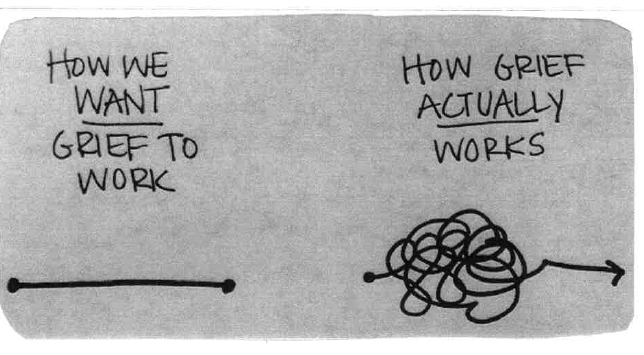Are There Really Stages of Grief?
Posted by Houston Sympathy Flower Shop on Sep 15th 2019

Without doubt, bereavement–the state of mourning the absence of someone dear to us–is one of the most difficult experiences in anyone's life. As the author of our webpage, Process of Grief wrote, "The grief process has a life of its own. It is a unique and profound time. We face what we have lost, our own mortality, and the challenge of learning to live without that special person. The journey can be overwhelming, confusing and even frightening, because our feelings are so intense and often out of control."
Is it any wonder we want to cling to the idea of "stages of grief"? The concept of stages is comforting; we understand it's meaning. It implies there is a standard process and if we follow along, working our way through distinct stages over time, we'll get through the challenge (quite an understatement) of grieving.
Some psychologists see bereavement as a series of 5 stages of grief. In The 5 Stages of Grief, David Kessler, who co-authored the book On Grief & Grieving: Finding the Meaning of Grief through the Five Stages of Loss with Elisabeth Kübler-Ross, wrote "The five stages...are a part of the framework that makes up our learning to live with the one we lost. They are tools to help us frame and identify what we may be feeling. But they are not stops on some linear timeline in grief. Not everyone goes through all of them or in a prescribed order."
What are the names of their 5 stages of grief? Known to many by the acronym DABDA, they are: denial, anger, bargaining, depression and acceptance.
Others declare there are 7 stages of grief. Here, the 5 stage grieving process proposed by Kübler-Ross is enhanced by adding two additional stages of grief. Initially, these folks argue, there is a time of shock or disbelief, which leads to the three initial stages of grief proposed by Kübler-Ross (denial, anger and bargaining).
This period of bargaining is then replaced by guilt; a stage when regrets surface. There a deep desire to "turn back the clock"–to get a "do over"–so we could do or say something differently.
The realization we'll never get the opportunity to "get things right", coupled with the day-to-day reality of our loved one's absence; can lead us into a stage of depression–a time when it becomes impossible to see an end to your sorrow and
grief.
The final stage of the 7 stages of grief is the same as that in the grieving process identified by Kübler-Ross, acceptance; but in this model, acceptance is complimented by hope. I think this is an important distinction, as the emotional and psychological benefits of finding hope in your heart are profound. The British poet Alfred Lord Tennyson captured the promise of hope in a mere 15 words:
“Hope Smiles from the threshold of the year to come, Whispering 'it will be happier'...”
Hope is essential to moving us forward in life. I believe if we had no hope in our hearts–or you may see it as poet Emily Dickenson did, where hope resides in our soul ("Hope is the thing with feathers -That perches in the soul...")–there would be no good reason to get out of bed in the morning.
So, thinking about grief as a series of stages gives us comfort. It doesn't matter if you want to claim there are 5 stages of grief, or 7 stages of grief; the truth of it is: there are no stages of grief–and thinking there are can be harmful to you. In fact, the author of the Huffington Post online article "The 5 Stages of Grief and Other Lies That Don't Help Anyone", licensed clinical counselor Megan Devine writes
"I bet you know what the stages are, even if you don't think of yourself as much of a psychology-type person. The stages are taught in introductory college courses, and were taught back when I was in hospice training. The stages are taught in grief and loss workshops. They come up in pop psychology and in clinical, scientific studies. The stages of grief are everywhere.
This means that many people, even professional psychologists, believe there is a right way and a wrong way to grieve, that there is an orderly and predictable pattern that everyone will go through, and if you don't progress correctly, you are failing at grief. You must move through these stages completely, or you will never heal.
This is a lie."
I couldn't agree more. The grief process is full of emotions and psychological states-of-being; experiences we label with words like shock, denial, anger, depression, acceptance and hope. And of course, bargaining is something all of us do with ourselves ("If I walk around the block one more time, I can have that piece of pie when I get home"); it's nothing out-of-the ordinary for us human beings.
A funeral director friend sent me this picture which is a perfect visual description of the grieving process:

Grief is not a straight path with landmarks along the way. Instead, it's a tangled mess. Yet with good self-care and the right kinds of support, you can find your way.
Fortunately, it's not hard to find that support. All you need do is to reach out to Celeste Miller, our Bereavement Coordinator. In addition to her experience as a hospice chaplain, she has a Master's Degree in Counseling. She is kind, compassionate and a remarkable listener. Why not give her a call? Not only can she help you to find practical support, Celeste can also tell you about our regularly scheduled grief support groups.
Here are two more thoughts for you, more valuable than either of the proposed " stages of grief" models of the grieving process. Again, this is from the author of our webpage, Process of Grief "It takes time, compassion for yourself and a willingness to allow this grief to evolve into a healing experience and a renewed life."
This statement is beautifully complimented by these four sentences, from Elisabeth Kubler-Ross and David Kessler: "You will not 'get over' the loss of a loved one; you will learn to live with it. You will heal and you will rebuild yourself around the loss you have suffered. You will be whole again but you will never be the same. Nor should you be the same, nor would you want to."


